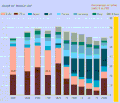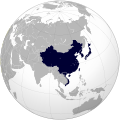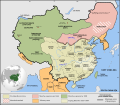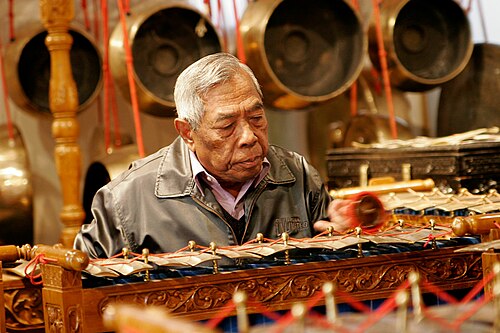Portal:Asia

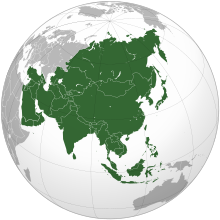 Asia (/ˈeɪʒə/ AY-zhə, UK also /ˈeɪʃə/ AY-shə) is the largest continent in the world by both land area and population. It covers an area of more than 44 million square kilometers, about 30% of Earth's total land area and 8% of Earth's total surface area. The continent, which has long been home to the majority of the human population, was the site of many of the first civilizations. Its 4.7 billion people constitute roughly 60% of the world's population. Asia shares the landmass of Eurasia with Europe, and of Afro-Eurasia with both Europe and Africa. In general terms, it is bounded on the east by the Pacific Ocean, on the south by the Indian Ocean, and on the north by the Arctic Ocean. The border of Asia with Europe is a historical and cultural construct, as there is no clear physical and geographical separation between them. It is somewhat arbitrary and has moved since its first conception in classical antiquity. The division of Eurasia into two continents reflects East–West cultural, linguistic, and ethnic differences, some of which vary on a spectrum rather than with a sharp dividing line. A commonly accepted division places Asia to the east of the Suez Canal separating it from Africa; and to the east of the Turkish Straits, the Ural Mountains and Ural River, and to the south of the Caucasus Mountains and the Caspian and Black seas, separating it from Europe. China and India traded places as the largest economies in the world from 1 to 1800 CE. China was a major economic power for much of recorded history, with the highest GDP per capita until 1500. The Silk Road became the main east–west trading route in the Asian hinterlands while the Straits of Malacca stood as a major sea route. Asia has exhibited economic dynamism as well as robust population growth during the 20th century, but overall population growth has since fallen. Asia was the birthplace of most of the world's mainstream religions including Hinduism, Zoroastrianism, Judaism, Jainism, Buddhism, Confucianism, Taoism, Christianity, Islam, Sikhism, as well as many other religions. (Full article...) Featured articleThe Battle of Musa Qala (also Qaleh or Qal'eh) was a British-led military action in Helmand Province, southern Afghanistan, launched by the Afghan National Army and the International Security Assistance Force (ISAF) against the Taliban on 7 December 2007. After three days of intense fighting, the Taliban retreated into the mountains on 10 December. Musa Qala was officially reported captured on 12 December, with Afghan Army troops pushing into the town centre. The operation was codenamed snakepit (Pashto: Mar Kardad). Senior ISAF officers, including U.S. general Dan K. McNeill, the overall ISAF commander, agreed to the assault on 17 November 2007. It followed more than nine months of Taliban occupation of the town, the largest the insurgents controlled at the time of the battle. ISAF forces had previously occupied the town, until a controversial withdrawal in late 2006. (Full article...)Selected Country Iraq, officially the Republic of Iraq, is a country in West Asia and in the geopolitical region known as the Middle East. With a population of over 46 million, it is the 30st-most populous country. It is a federal parliamentary republic that consists of 18 governorates. Iraq is bordered by Turkey to the north, Iran to the east, the Persian Gulf and Kuwait to the southeast, Saudi Arabia to the south, Jordan to the southwest, and Syria to the west. The capital and largest city is Baghdad. Iraqi people are diverse; mostly Arabs, as well as Kurds, Turkmen, Assyrians, Armenians, Yazidis, Mandaeans, Persians and Shabakis with similarly diverse geography and wildlife. Most Iraqis are Muslims – minority faiths include Christianity, Yazidism, Mandaeism, Yarsanism and Zoroastrianism. The official languages of Iraq are Arabic and Kurdish; others also recognized in specific regions are Turkish, Suret, and Armenian. Starting as early as the 6th millennium BC, the fertile alluvial plains between Iraq's Tigris and Euphrates Rivers, referred to as Mesopotamia, gave rise to some of the world's earliest cities, civilizations, and empires in Sumer, Akkad, and Assyria. Mesopotamia was a "Cradle of Civilisation" that saw the inventions of a writing system, mathematics, timekeeping, a calendar, astrology, and a law code. Following the Muslim conquest of Mesopotamia, Baghdad became the capital and the largest city of the Abbasid Caliphate, and during the Islamic Golden Age, the city evolved into a significant cultural and intellectual center, and garnered a worldwide reputation for its academic institutions, including the House of Wisdom. The city was largely destroyed at the hands of the Mongol Empire in 1258 during the siege of Baghdad, resulting in a decline that would linger through many centuries due to frequent plagues and multiple successive empires. (Full article...)Featured biographyAntiochus X Eusebes Philopator (Ancient Greek: Ἀντίοχος Εὐσεβής Φιλοπάτωρ; c. 113 BC – 92 or 88 BC) was a Seleucid monarch who reigned as King of Syria during the Hellenistic period between 95 BC and 92 BC or 89/88 BC (224 SE [Seleucid year]). He was the son of Antiochus IX and perhaps his Egyptian wife Cleopatra IV. Eusebes lived during a period of general disintegration in Seleucid Syria, characterized by civil wars, foreign interference by Ptolemaic Egypt and incursions by the Parthians. Antiochus IX was killed in 95 BC at the hands of Seleucus VI, the son of his half-brother and rival Antiochus VIII. Antiochus X then went to the city of Aradus where he declared himself king. He avenged his father by defeating Seleucus VI, who was eventually killed. Antiochus X did not enjoy a stable reign as he had to face three of Seleucus VI's brothers, Antiochus XI, Philip I and Demetrius III. Antiochus XI defeated Antiochus X and expelled him from the capital Antioch in 93 BC. A few months later, Antiochus X regained his position and killed Antiochus XI. This led to both Philip I and Demetrius III becoming involved. The civil war continued but its outcome is uncertain due to the contradictions between different ancient historians' accounts. Antiochus X married his stepmother, Antiochus IX's widow Cleopatra Selene, and had several children with her, including a future king Antiochus XIII. (Full article...)General imagesThe following are images from various Asia-related articles on Wikipedia. Featured pictureA gamelan is a kind of musical ensemble of Indonesian origin typically featuring metallophones, xylophones, drums, and gongs. The term can be used to refer either to the set of instruments or the players of those instruments. Traditionally, "gamelan" comes from the Javanese word "gamel", meaning hammer.
Did you know...
Updated: 6:33, 14 February 2024 In the news
Related portalsMajor Religions in Asia Middle East Central Asia and Surroundings Indian Subcontinent Southeast Asia East Asia Selected panorama
Baalbek is a town in the Beqaa Valley of Lebanon situated east of the Litani River. It is famous for its exquisitely detailed yet monumentally scaled temple ruins of the Roman period, when Baalbek, then known as Heliopolis, was one of the largest sanctuaries in the Empire. TopicsCategoriesAssociated WikimediaThe following Wikimedia Foundation sister projects provide more on this subject:
More portalsShortcuts to this page: Asia portal • P:ASIA Purge server cache |























